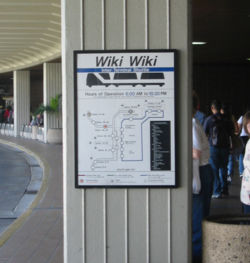What is a wiki?
| IUT 2009 MediaWiki Workshop | ||
|---|---|---|
| Introductory topics | What is a wiki? | Creating an account | Editing Basics | Basic Text Formatting | New Pages and Links | Inserting Images | Collaborative Editing | |
| Intermediate topics | Communicate and Interact | Collaborative Video Editing | Virtual Experiment | Inserting Media | |
| IUT Workshop | ||
|---|---|---|
| Tutorial 1 | Introduction | Advantages and Disadvantages | About WikiEducator | Summary & FAQs | |
What is a Wiki?

A wiki is a web site that is generally editable by anyone with a computer, a web browser, and an internet connection. Wikis use a quick and easy syntax to allow users to apply formatting to text and create links between pages. This simple formatting syntax means that authors no longer need to learn the complexities of HTML to create content on the web.
The main strength of a wiki is that it gives people the ability to work collaboratively on the same document. The only software you need is an Internet browser. Consequently, wikis are used for a variety of purposes. If you make a mistake, it's easy to revert back to an earlier version of the document.
Examples of Wikis
The largest and most talked about Wiki on the Internet is Wikipedia[1]
Wikipedia is, for the most part, editable by anyone in the world with a computer and an internet connection and, as of Nov 2008, contained over 10,000,000 articles in more than 250 languages. Two and a half million pages in English! There are also more than 250,000 articles in German, French, Polish, and Japanese; and more than 100,000 articles in Spanish, Italian, Dutch, Portugese, Russian, Swedish, and Chinese. While Wikipedia's mission is to create an encyclopedic resource of knowledge, wikis can be used for a variety of purposes and are quickly becoming the defacto technology for collaborative group work online. They can be great social tools for classrooms, teams, community groups, or can even be configured to provide easily updatable web sites for organisations.
The following wikis display a range of different applications of wiki technology:
- Wikitravel[2] - a project to create a free, complete, up-to-date, and reliable world-wide travel guide.
- WikiWikiWeb[3] - the first ever wiki, it has been around since 1995.
- eXe Project[4] - an example of how a wiki can be used to run a web site.
- Physics for the Life Sciences Wiki[5] - the start of an online course book.
- Scholarpedia[6] - a wiki project based on a system of peer review.
There are literally thousands of wikis around the web on a diverse range of subjects and supporting many communities.
| The purpose of this activity is to introduce you to a few examples of wiki projects. In this activity you are encouraged to visit at least two of Wikipedia's sister projects listed below.
For each of the Wikimedia project sites, you should:
You can follow the links to Wikimedia projects below:
|
Many of Wikipedia's sister projects were initiated because the encyclopedia was being cluttered by entries that were not appropriate for an encyclopedia.
For a more in depth tutorial please visit the WikiEducator "What is a wiki?" tutorial.
URL links in this section
- ↑ http://en.wikipedia.org
- ↑ http://wikitravel.org/en/Main_Page Wikitravel
- ↑ http://c2.com/cgi/wiki?WelcomeVisitors WikiWikiWeb
- ↑ http://exelearning.org eXe Project
- ↑ http://cad.auckland.ac.nz/wiki/Physics_160 Physics for the Life Sciences Wiki
- ↑ http://www.scholarpedia.org/article/Main_Page Scholarpedia
- ↑ http://en.wikinews.org/wiki/Main_Page Wikinews
- ↑ http://commons.wikimedia.org/wiki/Main_Page Wikimedia Commons
- ↑ http://en.wikiversity.org/wiki/Wikiversity:Main_Page Wikiversity
- ↑ http://en.wikiquote.org/wiki/Main_Page Wikiquote
- ↑ http://en.wiktionary.org/wiki/Main_Page Wiktionary
- ↑ http://en.wikibooks.org/wiki/Main_Page Wikibooks
